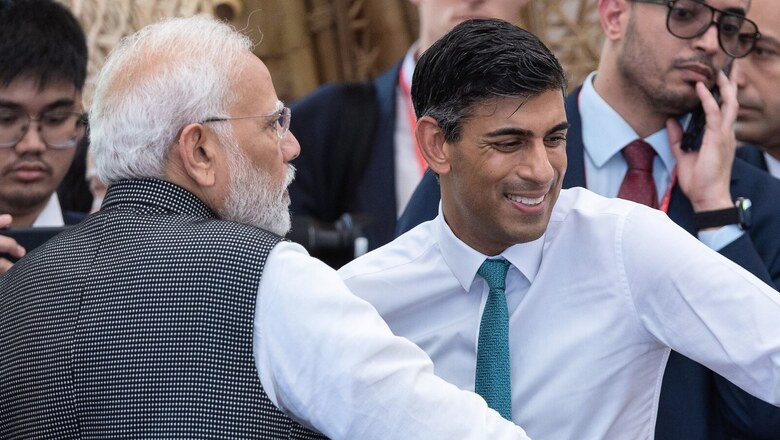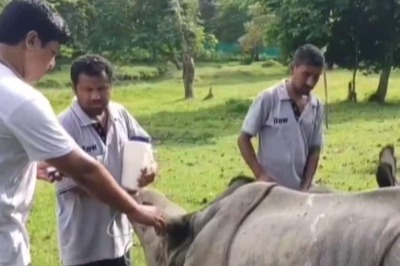
views
Sarojini Naidu, an important activist of the Indian independence movement who also served as a nurse to Indian soldiers in World War I, wrote a very poignant poem called ‘Gift of India’, it highlighted the sacrifices of Indian soldiers. Their efforts to battle poverty and earn a living took them to continents and borders around the world to fight some historic battles. They often fought under unimaginable circumstances, but their contributions remain understudied, but nevertheless are a significant part of India’s rich history.
Today, moving beyond the armed forces, Indians are making their mark and carving their own sphere of influence as ‘global citizens’. They are soft power symbols, but are responsible for making hard decisions to govern and take their countries forward by solving grand challenges for their respective populace and the world at large. In essence, they are furthering the Indian story as contributors to the Asian dream.
Recently, Aruna Miller became the first South Asian to hold the Lieutenant Governor’s office in Maryland in the US mid-term polls. Votes are still being counted as this piece is being written.
Previously, Rishi Sunak became the United Kingdom’s Prime Minister. Former Prime Minister David Cameron is on record stating that the country will have an Indian prime minister during one of Indian Prime Minister Narendra Modi’s community events in the United Kingdom. However, Rishi Sunak is not alone.
Mohamad Irfann Ali of Guyana, Antonio Costa of Portugal, Pravind Jugnauth of Mauritius, Prithvirajsing Roopun, the President of Maldives and Chandrikeprasad Santokhi of Suriname are all Indian-origin leaders, who are leading their countries as prime ministers or presidents. Non-state actors such as organisations like the Indiaspora are documenting the works of Indians globally, especially in important leadership positions. The 2021 Indiaspora Government Leaders List is by far the most comprehensive effort to document Indian diaspora’s impact. The list documents close to 200-plus leaders, who have ascended to high ranks across the globe, spanning 15-plus countries.
As per research, the Indian immigrant group in Anglo-Saxon countries has been steadily rising. It is the largest in the United Kingdom and Canada and the second largest in the United States. Devesh Kapur’s comprehensive data-driven book, ‘The Other One Percent: Indians in America’ on the Indian immigrant population and its impact in the United States is a worthy study on what has shaped the community in the United States.
In 2004, India broadly defined diaspora as ‘a generic term to describe the people who migrated from territories that are currently within the borders of the Republic of India. It also refers to their descendants.’ Today they are referred to as Non-Resident Indians (NRIs), Persons of Indian Origin (PIOs) and Overseas Citizens of India (OCI). In September 2002-03, the Central Government of the day set up a high-level committee on the diaspora under Dr. L. M. Singhvi. Most of what we see today of the actions towards diaspora will certainly find mention in the report. It has been two decades since the said committee’s report.
For India, much needs to be done to tap into the potential of Indians living abroad.
Global engagement is one of the key aspects of a country’s public diplomacy. The diaspora is a very important pillar of India’s public diplomacy and overall foreign policy orientation. Prime Minister Narendra Modi has been very effective in engaging with the diaspora by communicating directly through his much acclaimed and widely attended community events in the past. These events have also seen leaders in respective countries participate.
An important need is for the government to come up with a comprehensive policy for a holistic engagement with these incredible persons of Indian origin.
According to the Committee on the Ministry of External Affairs’ 15th report, tabled in Parliament in August 2022, the Indian diaspora comprises over 18 million persons of Indian origin (PIO) and 13 million non-resident Indians (NRIs, meaning Indian citizens living abroad), making it the largest overseas community globally. Given these numbers, the committee has recommended that the government introduce a policy document that can serve as a “guiding principle for a deeper and wider connection with NRIs, while also playing a more proactive role in developing closer contact with them”.
The committee goes onto stating the importance of creating a database for the diaspora as well as the necessary rehabilitation of students who have been harmed due to the conflict in Ukraine as well as those who returned from China during COVID-19.
Since 2020, I have been a firm votary of a formal diaspora policy that could serve as a guiding force for India. The policy must consider the long historical legacy of the diaspora. Globally, there are countries which have made the diaspora an integral part of their national development process. Kenya, for example, has a diaspora policy formally incorporated into their foreign policy in tune with attaining some of their developmental goals in the run-up to 2030. It is true, comparisons with Kenya may not be fruitful with the sheer size of the Indian global footprint. However, a policy document and institutionalizing it is the need of the hour, keeping current challenges of war, geo-strategic imbalances, and pandemics in mind. With incredible transfer of power taking place from states and bigger institutions to smaller institutions and individuals, a constructive and futuristic engagement with the Indian diaspora becomes imperative.
As a subset to this policy, India can also commission independent studies on diaspora in various countries with up to date datasets to ascertain their engagement. In a multi-centric world, this task could mean that it may be beyond the scope of embassies or high commissions and the inclusion of credible non-state actors such as think tanks and organisations to enable them to attain the objectives of the foreign policy of the government will help. A combination of key individuals in both India and abroad could come onboard to advise on the Government’s diaspora policy document. This will help India adopt a country-specific strategy when it comes to assessing the challenges and opportunities of the Indian diaspora. This automatically will facilitate India to incorporate the diverse views of its diaspora cutting across various fields of expertise.
India could use the policy as a platform to ‘listen’ to the voices of the Indians abroad, how they view their country, and effectively design their overall narrative that is civilizational and pragmatic. With India marching towards 100 years of Independence, this step will be an important addition to the overall growth story of the country.
This is no doubt a time-consuming task, but a policy-driven diaspora engagement can be a model for the world to emulate.
The writer is an author and researcher. He tweets at @sudarshanr108. Views expressed are his own.
Read all the Latest Opinions here


















Comments
0 comment